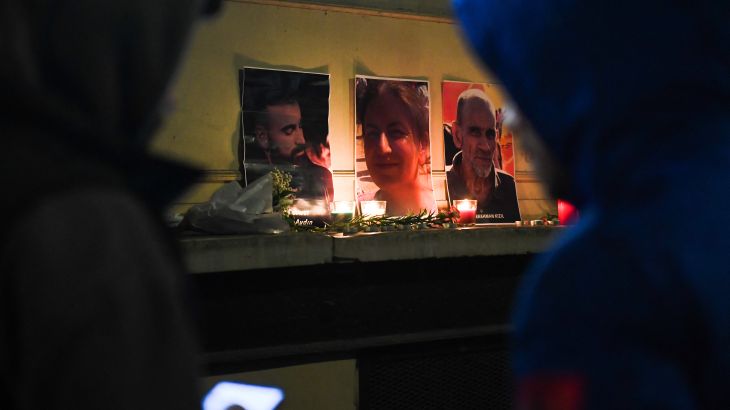Thousands attend funeral of three Kurds killed in Paris shooting
A xenophobic gunman is suspected of killing two men and one woman at a Kurdish cultural centre last month.

With tears and cries of “Martyrs live forever”, thousands of Kurds from across Europe have come to the suburbs of Paris to say farewell to three of their own killed in a December attack in the French capital.
Buses were chartered to bring people from across France and some neighbouring countries to the politically charged funeral in Villiers-le-Bel, north of Paris.
Keep reading
list of 4 itemsParis shooting suspect has a ‘pathological hatred of foreigners’
Suspect in Paris shooting transferred to psychiatric unit
Turkey summons French ambassador after Paris shooting
The coffins of the three people – one woman and two men – were wrapped in the flags of the Kurdistan Workers’ Party (PKK) and the Kurdish-controlled Rojava territory in northern Syria.
The crowd followed the funeral on giant screens erected in a car park, showing the coffins surrounded by wreaths beneath a portrait of PKK leader Abdullah Ocalan, who is serving a life sentence on a prison island off Istanbul.
Police and security volunteers were on duty outside a hall hired for Tuesday’s funeral.
A xenophobic gunman is suspected of killing the three Kurds on December 23. The victims were shot inside and in front of the Ahmet-Kaya centre, a cultural organisation for the Kurdish community in Paris’s 10th district.
The three victims were identified as Abdurrahman Kizil; singer and political refugee Mir Perwer; and Emine Kara, a leader in the Movement of Kurdish Women in France.
William Malet, 69, was formally charged in the shootings on December 26. He told investigators he had a “pathological” hatred for foreigners and wanted to “murder migrants”, prosecutors said.
Finger pointed at Turkey
Malet, a retired train driver, had previous convictions for assault and possession of an illegal weapon. He had just left a year of detention for a sword attack at a migrant camp.
But many Kurds in France’s 150,000-strong community refuse to believe that he acted alone, calling his actions a “terrorist” attack and pointing the finger at Turkey.
“The anger of the people gathered today has again proven to us how much the Kurdish community believes these murders are political,” said a spokesman for the Democratic Council of Kurds in France.
In January 2013, three Kurdish female activists – including Sakine Cansız, a co-founder of the PKK – were shot dead near the cultural centre.
Their suspected killer, Omer Guney, a Turkish national believed to have had ties to Ankara’s secret services, died of a brain tumour in a Paris hospital in 2016 in pre-trial detention.
More recently, men were beaten with iron bars in April at a Kurdish cultural centre in the eastern French city of Lyon. That attack was blamed on members of the banned Turkish ultra-nationalist group Grey Wolves.
The PKK, which has waged an almost four-decade armed struggle for greater rights for Turkey’s Kurdish minority, is categorised as a “terrorist” group by Ankara, the European Union and the United States.
Clashes between police and Kurdish demonstrators in the immediate aftermath of the December killings ratcheted up tensions between nominal NATO allies Turkey and France.
Ankara’s foreign ministry summoned the French ambassador to complain of “black propaganda launched by [the] PKK”.
Activists with the Democratic Council of Kurds in France have planned a march on Wednesday for the December shooting victims on the street where they were killed.
On Saturday, a “grand march” of the Kurdish community, originally planned to mark the 10th anniversary of the 2013 shootings, will set off from Paris’s Gare du Nord railway station.